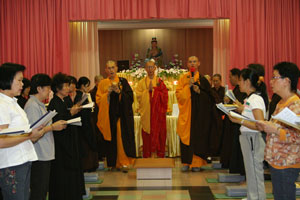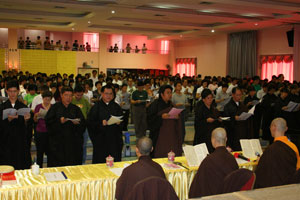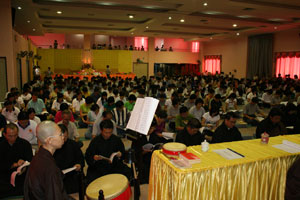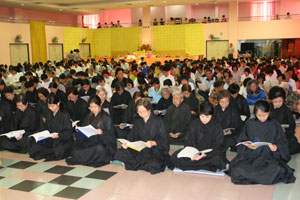Submitted by zhenliang on
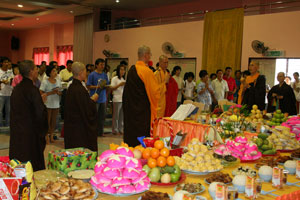
The Qing Ming Festival is a traditional Chinese festival, usually occurring around April 5 of the Gregorian calendar. Every leap year, Qing Ming falls on April 4. It is the day for the Chinese to tend to the graves of their departed. The most common English translations of Qing Ming Festival are Tomb Sweeping Day and Clear Brightness Festival ( 清明 节).
The Festival is very important to the Chinese as it is the day to remember and honour one's ancestors. The family members pray before the ancestors, sweep the tombs and offer food, tea, wine, joss sticks, and paper accessories to the departed.
Qing Ming was frequently mentioned in Chinese literature. Among these, the most famous one is probably the Du Mu ( 杜牧) poem (entitled “Qing Ming”):
清明时节雨纷纷 / qing ming shi jie yu fen fen
路上行人欲断魂 / lu shang xing ren yu duan hun
借问酒家何处有 / jie wen jiu jia he chu you
牧童遥指杏花村 / mu tong yao zhi xing hua cun.
English translation:
A drizzling rain falls like tears on the morning day.
The mourner with a broken heart is on his way.
Where can a wine shop be found to drown his sad hour?
A cowherd points to a cottage “mid apricot flowers'.
On this festival of remembrance of the ancestors, Than Hsiang Temple organized and conducted the 3 Sessions of Amitabha (Pure Land) chanting for the transference of merits to the departed so that they would be reborn in Pure Land.
The chanting is designated 3 Sessions in line with the ancient Indian configuration in dividing the hours of a day into 3 day watches and 3 night watches. The Three Sessions Amitabha chanting was conducted over the three day watches incorporating the morning, noon and evening hours. The Three Sessions format comprised seven categories of sutra recitation, Amitabha chanting, Dharma sharing, cultivation, repentance, vows, and Buddhist hymns.
Venerable Wei Wu, in his Dharma talk, mentioned that some businessmen have been selling all sorts of paper accessories to be burned in the belief that the departed would receive them. In actual fact, the act itself will not benefit the deceased, besides the practice being a waste of money. Buddhists should, in the process of remembering the departed ancestors, seek to develop wisdom and transfer their merits gained to them with the wish that they may attain Nirvana.
Venerable Wei Wu recounted the origin of the Qing Ming festival. During the Spring and Autumn Period, Chong'er, the Duke Wen of the state of Jin was in exile and almost died from hunger. His personal friend and minister Jie Zhitui saved his life by feeding him with Jie Zhitui's own flesh. Eventually, Chong'er regained his throne and rewarded all who had helped him in time of distress. Jie Zhitui declined any offer of reward and went into the hill with his mother to live a secluded life. In the hope of making Jie Zhitui return to him, Chong'er set fire to the hill. Unfortunately Jie Zhitui and his mother were burnt to death.
Chong'er was so filled with remorse that he decreed that for three days starting from the eve of Qing Ming, people were not allowed to use fire to heat up food, thus nicknaming the cold food festival (Hanshi).
This year's Qing Ming Dharma assembly was attended by nearly 700 people, filling the Multi Purpose Hall almost to the brim. The Hall resonated with the sound of chanting of Amituofo, repentances and vows, permeating the whole Than Hsiang Temple.
After the completion of the chanting sessions, Venerable Wei Wu introduced the lecturers and student members of the International Buddhist College (IBC) Dharma Tour group on stage for a sharing session. Venerable Zhen Chan opined that IBC, besides being synonymous to a Pure Land for the Sangha, also serves as a cradle for Sangha education. Ven Zhen Yuan expressed her gratitude for the opportunity to study in IBC with its excellent environment. Venerable Diana, an Argentina Maechee, described the assembly as a beautiful experience and complimented the fine work done by Than Hsiang Temple.
This sharing was followed by an appeal from Venerable Wei Wu to support the “Planting a Thousand Trees with One Heart” project in aid of the education fund of IBC. He further stressed the role of education in safeguarding the future of the Buddha Dharma.
Before the assembly came to a close, Venerable Wei Wu encouraged all devotees to actively participate in the Eight Precepts Retreat and all Dharma assemblies organized by Than Hsiang Temple. He also wished that all will strive hard to attain enlightenment.
